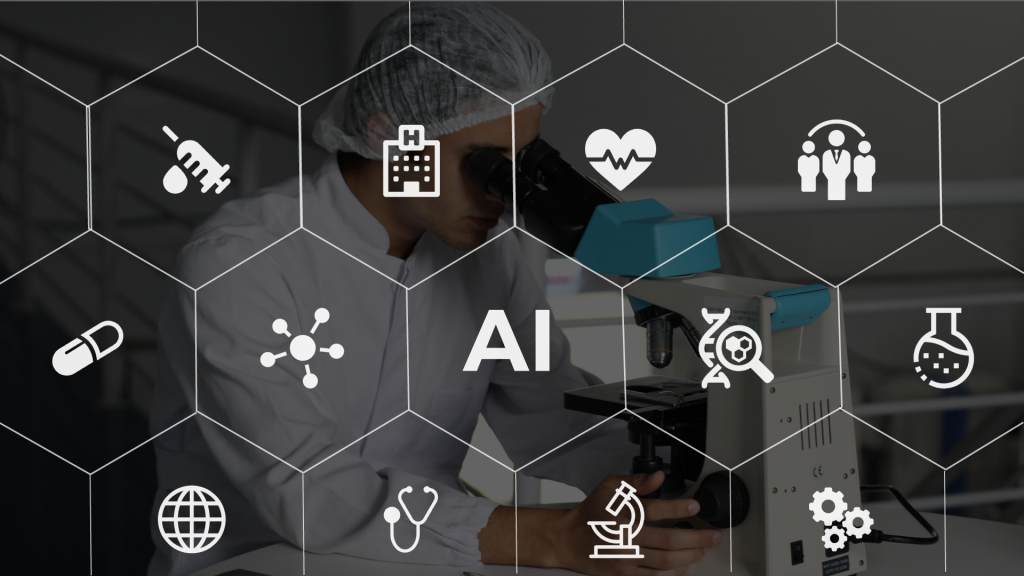We are under the spell of the Fourth Revolution or the digital revolution. The ability of technology to help the humankind is empowering each day. With AI, Machine Learning, IoTs, and Virtual Reality we are witnessing a diminishing line between man and machine. While the machine is helping man to live luxuriously, it has also extended its help in saving lives.
The use cases of Artificial Intelligence[AI] in healthcare are fascinating – be it Robotic Surgery, digital consultation, managing medical records over a blockchain network or a virtual nurse assisting you. AI in health is assisting machines to sense, analyze, act, diagnose and help in the clinical and administrative task in a hospital.
Let’s explore in detail on how AI is helping humans to stay healthy and save lives.
Assisting Patient at Every Step
An AI app/product could effectively scan the medical records and help in diagnosing the particular disease, minimizing chances of human error. Based on the prescriptive analysis, the AI software could aid real-time case prioritization. It can precisely analyze actions and predict the risk associated with specific clinical procedures.
AI programs could also help in providing personalized services based on patient data and moods. In fact, an AI app can also recommend the best doctor as per your medical record. AI can be a helping hand for many expectant mothers, with continuous monitoring and ability of early diagnosis.
Several wearable devices and health apps are assisting customers in keeping track of their health. Health apps like Cure.fit help customers to order healthy food and keep tabs on their daily workouts. People can also book appointments and buy medicines through apps like Practo.
Reaching New Heights in Research and Development
Collecting data samples of all the patient in a clinic/hospital, applying big data techniques and deep learning technology could help in extracting meaningful information. Such information could be used to study pattern for a disease or about an individual.
Genetics and study of genes are one of the most crucial jobs in healthcare, with AI the study could be exhaustive and precise resulting in impactful drugs and medicine. Applying medical intelligence could help in understanding the connection between drug and disease at the root level.
Helping Hospitals with Pricing, Risk, and Operations
In need of a marketing strategy that highlights the pain points, lessons learned, target segment and market perception? AI could help you. It can present you a unique strategy that helps in modeling competitive pricing charts,understanding market risk and structuring market data into meaningful actions. Rehauling of your repetitive tasks or back office could be achieved by implementing Robotic Process Automation[RPA] into your system.
With voice-enabled chatbots and video conferencing chatbots, customer queries and appointment booking can be facilitated in private clinics and healthcare sectors
Virtual Nurses, Healthcare Bots
Are you in need of the second opinion from the country’s best doctor at the convenience of your home? AI can help you with Digital Consultation. Or you need a nurse who helps in keeping track of your medicines and food; Virtual Nurse is on his way. Or you need help in picking the best diagnostic center based on your health records? Or you need help in what are the side effects of a drug? Healthcare bots are in for the rescue.
All of this may sound like a sci-fi movie being watched, but now is a possibility with AI and machine learning technology.
Other significant innovation is the chatbot. Chatbots help in raising alarms during life-threatening incidents and save the needful. During an emergency situation, a call made by the chatbot to the needy’s family/ friends or a health center can help the suffering person.
Write us at hello@mantralabsglobal.com to know how we are helping healthcare businesses through AI technology.
Check out the webinar on ‘Digital Health Beyond COVID-19: Bringing the Hospital to the Customer’ on our YouTube channel to know more about how the digital health industry is disrupting the traditional ways of healthcare.
Knowledge thats worth delivered in your inbox





